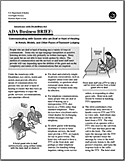RID
Code of
Professional Conduct
-
Confidential communication
-
Professional skills and
knowledge
-
Appropriate conduct
-
Respect for consumers
-
Respect for colleagues,
interns, students
-
Ethical business practices
-
Ongoing professional
development
|
|
|
|
|
|
Resources
|
|
Registry of Interpreters for the Deaf (RID) |
|
RID is a
national membership organization representing the
professionals who facilitate communication between
people who are deaf or hard of hearing and
people who hear. RID adds value to the profession
and for the consumer through education, standards,
relationships and resources.
RID has a tri-fold
approach to the standards it maintains for
membership: |
|
National Testing System (NTS)
strives to maintain strict adherence to
nationally recognized testing industry
standards of validity, reliability, equity
and legal defensibility.
Certified Maintenance Program (CMP)
is an avenue through which the continued
skill development of certified interpreters/transliterators
is monitored and nourished
Ethical Practices System (EPS) and NAD-RID
Code of Professional Conduct (CPC)
are two vehicles which provide guidance and
enforcement to professionalism and conduct.
The EPS provides an opportunity for
consumers to address concerns or file
complaints regarding the quality of
interpreter/transliterator services, and the
CPC sets the standards to which all
individuals holding RID certification are
expected to adhere.
|
|
 |
|
ADA Information Line |
|
If you have specific questions concerning the ADA,
call the Department of Justice ADA Information Line.
(800) 514-0301 (voice)
(800) 514-0383 (TTY)
|
 |
|
Hospital/Medical Setting Brief
from the Americans with Disabilities Act (ADA) |
Effective communication is particularly critical in
health care settings where miscommunication may lead
to misdiagnosis and improper or delayed medical
treatment. Under the Americans with Disabilities Act
(ADA), hospitals must provide effective means of
communication for patients, family members, and
hospital visitors who are deaf or hard of hearing.
The ADA applies to all hospital programs and
services, such as emergency room care, inpatient and
outpatient services, surgery, clinics, educational
classes, and cafeteria and gift shop services.
Wherever patients, their family members, companions,
or members of the public are interacting with
hospital staff, the hospital is obligated to provide
effective communication.Read more
here.
|
 |
|
|
|
Under the Americans with Disabilities Act
(ADA), hotels and motels must provide effective
means of communications for persons who are deaf or
hard of hearing to ensure that they have an equal
opportunity to enjoy the goods, services,
accommodations, and amenities offered.
Read more
here. |
 |
|